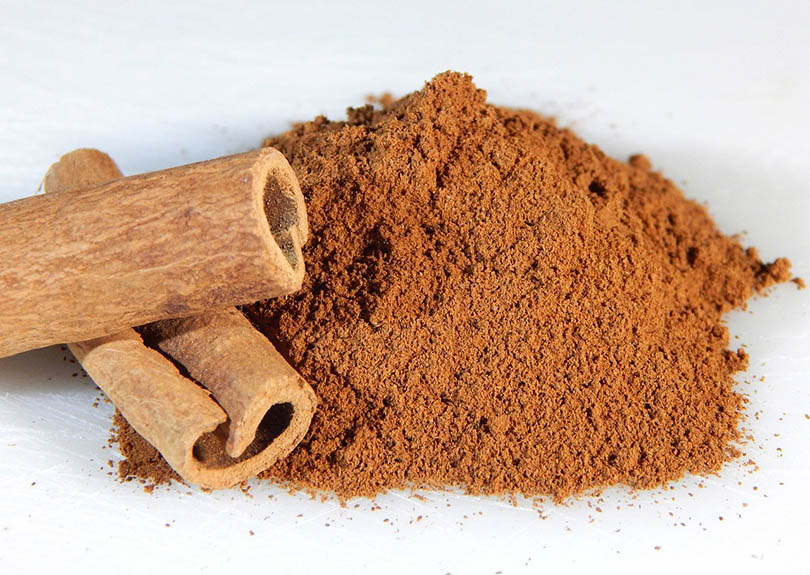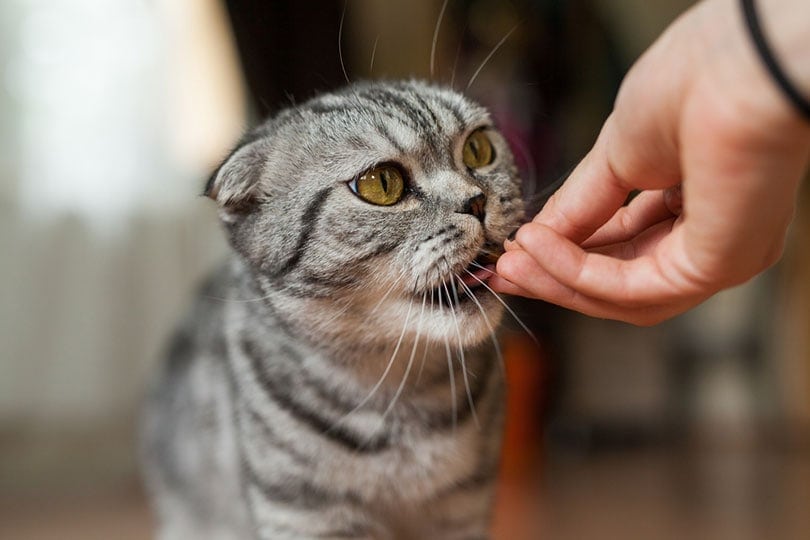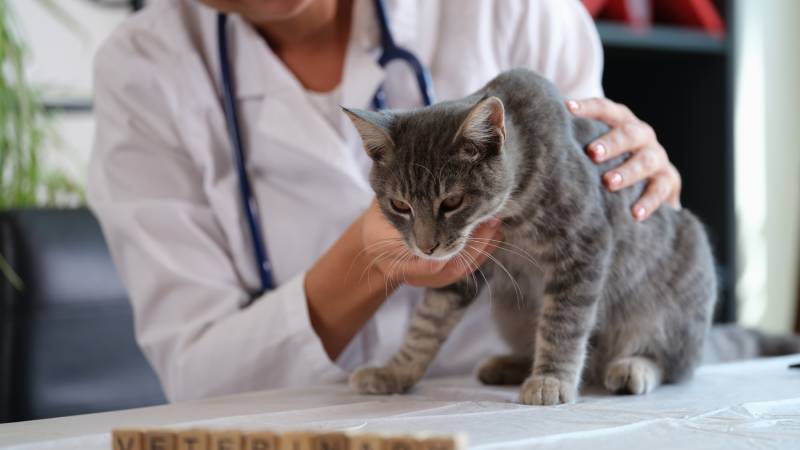
Click to Skip Ahead
Falling in love with a cat is one of the great joys in life, but it’s also stressful. You want to protect something you love so much and give it the best life possible. That includes knowing what is safe and unsafe to eat. So, can cats have cinnamon? No, although cinnamon is classified as non-toxic to cats by the ASPCA and small quantities won’t hurt them, it’s not beneficial for them either, and in large amounts, it can be harmful.
Cinnamon & Cats
Potential Effects
While cinnamon is not classified as a toxic substance for cats by theASPCA, it can lead to health complications depending on the form and quantity that a cat is exposed to.
Cinnamon contains a compound called coumarin, which can be harmful to cats in large amounts. Ingesting too much cinnamon can cause mouth irritation, vomiting, diarrhea, low blood sugar, liver disease, changes in heart rate, and even central nervous system damage in severe cases. Additionally, inhaling cinnamon powder can lead to coughing, choking, breathing difficulties, and bronchospasm (constriction of airways in the lungs).
The Pet Poison Helpline advises that it would normally take ingestion of more than 1 teaspoon of cinnamon powder to cause issues for our pets. So, while a small, occasional lick of cinnamon might not harm your cat, it’s best to avoid feeding it to them.
Inhalation Risks
Cinnamon powder, if inhaled by cats, can cause respiratory distress. The fine particles of the powder can irritate the sensitive lining of their lungs, leading to coughing, choking, and difficulty breathing. Extended exposure to cinnamon powder can potentially lead to more serious respiratory issues. Given these risks, it’s important to keep items like cinnamon powder out of your cat’s reach and to be mindful of their exposure during cooking or baking activities.
Topical Use
Cinnamon essential oil, a concentrated form of cinnamon often used in topical products, can pose a risk to cats. The chemicals in essential oils are rapidly absorbed by cats through their skin or orally. Cats are very sensitive to essential oils and struggle to metabolize them, even small amounts can cause serious health issues. Signs of exposure may include drooling, vomiting, tremors,wobbliness, respiratory distress and even difficulty breathing and collapse. It’s crucial to avoid using products containing cinnamon essential oil on or around your cat.

Cinnamon Candles, Melts, Sprays & Cleaners
Scented items such as candles, melts, sprays, and cleaners should also be avoided in households with cats. The fragrances used in these products can have a powerful effect on cats’ senses of smell, which can lead to excessive grooming or other behaviors. Some scents may even cause an allergic reaction in cats. Therefore, it’s important to keep items like these out of your cat’s environment to ensure their safety.
Your Cat’s Dietary Needs
Carnivorous Nature
Cats are obligate carnivores, meaning they rely on a diet primarily composed of meat. This dietary requirement is a direct result of their evolutionary development as hunters. Unlike humans and some other animals, cats’ bodies lack the ability to properly process plant-based foods and derive most of their nutrition from animal protein. Therefore, feeding them a diet that aligns with their natural carnivorous inclinations is essential for their overall health.
Sensitivity to Certain Foods
Cats can exhibit sensitivity to certain foods, including some herbs and spices. While some ingredients are known to be toxic, even those classified as non toxic can still lead to digestive upset in cats such as vomiting and diarrhea. It’s important to be aware of these potential sensitivities and to avoid feeding your cat anything that could potentially upset their stomach.
Nutritional Requirements
Cats have specific nutritional requirements that need to be met for them to maintain optimal health. One such requirement is taurine, an amino acid found in meat, which is vital for many aspects of a cat’s health, including heart function, vision, and reproduction. Unlike many other animals, cats cannot produce taurine within their bodies and must obtain it from their diet. As such, they don’t require spices like cinnamon in their meals. Instead, their dietary needs should be fulfilled with foods rich in the nutrients they require, such as high-quality, animal-based protein sources.

Safe Treats for Cats
Commercially Prepared Treats
When it comes to treats, commercially prepared cat treats are typically a safe bet. These treats are designed with a cat’s dietary needs in mind and are formulated to be both appealing and safe for your feline friend. However, like all treats, they should be given in moderation and should not replace a balanced diet.
DIY Treats
If you prefer making homemade treats for your cat, it’s essential to use only cat-safe ingredients. While preparing DIY treats allows you to control exactly what goes into your cat’s snacks, it’s equally important to know what should be left out. Spices or flavorings like cinnamon should be avoided, as they can cause digestive upset and offer no nutritional benefits to your cat.
Fresh Meat
Offering small pieces of fresh, cooked meat can be a wonderful treat for cats. Meat is a natural part of a cat’s diet and is something they instinctively enjoy. Whether it’s chicken, turkey, or fish, make sure the meat is cooked thoroughly and is not seasoned with any spices or sauces. Remember, though, that while meat is a great source of protein, it should be offered as a treat and not a replacement for complete and balanced cat food.

FAQ
A: No, cats should not eat cinnamon cookies. The sugar and butter in cookies are not good for cats, and the cinnamon could potentially cause digestive upset.
Q: Can I use cinnamon essential oil around my cat?
A: No, cinnamon essential oil can be harmful to cats. The compounds in the oil can be absorbed orally, as well as through their skin, which can lead to health issues.
Q: What should I do if my cat ate a large amount of cinnamon?
A: If your cat consumes a large amount of cinnamon, contact your vet for advice and monitor them closely for signs of distress. If they show vomiting, diarrhea, or changes in behavior, contact a vet immediately.

Q: Can cats drink milk with cinnamon?
A: Cats should not drink milk with cinnamon. Many adult cats are lactose intolerant, and the cinnamon could cause additional digestive upset.
Q: Can cinnamon be used as a natural flea repellent for cats?
A: While some people use cinnamon as a natural flea repellent, it’s not recommended for cats due to the potential risks associated with its use and lack of efficacy.
Knowing exactly what your feline companion can and cannot eat will help you become the best pet parent. Recognizing that not all cat bowls are equal is also key! The Hepper NomNom Cat Bowl sets itself apart from traditional options by catering to the specific needs of cats. The innovative design offers whisker relief via shallow dishes and promotes digestion with a slight bowl elevation. Find out if the Hepper NomNom is right for your cat by clicking here.
At Pet Keen, we’ve admired Hepper for many years and decided to take a controlling ownership interest so that we could benefit from the outstanding designs of this cool cat company!
Conclusion
As responsible pet owners, it’s important to keep our cats’ diet suited to their specific nutritional needs, focusing on high-quality cat food and avoiding unnecessary additions like cinnamon and other spices. When in doubt about any food, it’s always best to consult with a veterinarian, or just say no. Your kitty will appreciate you keeping them safe.
Featured Image Credit: UlrikeLeone, Pixabay









